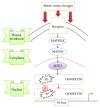WRKY proteins: signaling and regulation of expression during abiotic stress responses
- PMID: 25879071
- PMCID: PMC4387944
- DOI: 10.1155/2015/807560
WRKY proteins: signaling and regulation of expression during abiotic stress responses
Abstract
WRKY proteins are emerging players in plant signaling and have been thoroughly reported to play important roles in plants under biotic stress like pathogen attack. However, recent advances in this field do reveal the enormous significance of these proteins in eliciting responses induced by abiotic stresses. WRKY proteins act as major transcription factors, either as positive or negative regulators. Specific WRKY factors which help in the expression of a cluster of stress-responsive genes are being targeted and genetically modified to induce improved abiotic stress tolerance in plants. The knowledge regarding the signaling cascade leading to the activation of the WRKY proteins, their interaction with other proteins of the signaling pathway, and the downstream genes activated by them are altogether vital for justified targeting of the WRKY genes. WRKY proteins have also been considered to generate tolerance against multiple abiotic stresses with possible roles in mediating a cross talk between abiotic and biotic stress responses. In this review, we have reckoned the diverse signaling pattern and biological functions of WRKY proteins throughout the plant kingdom along with the growing prospects in this field of research.
Figures



References
-
- RoyChoudhury A., Gupta B., Sengupta D. N. Trans-acting factor designated OSBZ8 interacts with both typical abscisic acid responsive elements as well as abscisic acid responsive element-like sequences in the vegetative tissues of indica rice cultivars. Plant Cell Reports. 2008;27(4):779–794. doi: 10.1007/s00299-007-0498-1. - DOI - PubMed
-
- Ferro A., editor. Abiotic Stress: Role in Sustainable Agriculture, Detrimental Effects and Management Strategies. New York, NY, USA: Nova Science; 2014. (Environmental Health—Physical, Chemical and Biological Factors).
Publication types
MeSH terms
Substances
LinkOut - more resources
Full Text Sources
Other Literature Sources

